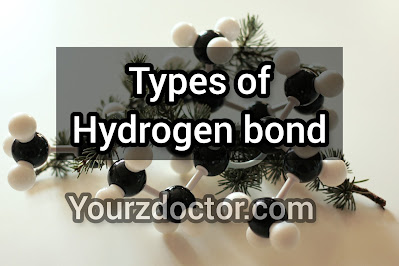Introduction:
Hydrogen
bonding is one of the most important and fascinating forces that shape the
world we live in. It is a special type of intermolecular force that occurs when
a hydrogen atom is covalently bonded to a highly electronegative atom such as
nitrogen, oxygen, or fluorine, and forms an electrostatic interaction with
another electronegative atom. This type of bonding plays a crucial role in many
biological and chemical processes, including DNA replication, protein folding,
and the properties of water.
What is Hydrogen Bonding?
As
mentioned earlier, hydrogen bonding is a special type of intermolecular force
that occurs when a hydrogen atom is covalently bonded to a highly
electronegative atom such as nitrogen, oxygen, or fluorine, and forms an
electrostatic interaction with another electronegative atom. The hydrogen bond
is a type of dipole-dipole interaction, which means it is a force between two
molecules that have permanent dipoles.
A
dipole is a separation of electric charge that occurs when there is a
difference in electronegativity between two atoms in a molecule.
Electronegativity is the measure of an atom's ability to attract electrons
towards itself in a covalent bond. In a hydrogen bond, the hydrogen atom has a
partial positive charge (δ+) because it is less electronegative than the
electronegative atom it is bonded to (e.g., oxygen). The electronegative atom,
in turn, has a partial negative charge (δ-) because it is more electronegative
than the hydrogen atom.
Types of Hydrogen Bonds:
There
are two main types of hydrogen bonds: intermolecular hydrogen bonds and
intramolecular hydrogen bonds. Intermolecular hydrogen bonds occur between
different molecules, while intramolecular hydrogen bonds occur within a single
molecule.
Intermolecular Hydrogen Bonds:
Intermolecular
hydrogen bonding is the most common type of hydrogen bonding. It occurs between
different molecules that have hydrogen atoms bonded to electronegative atoms.
For example, water molecules can form hydrogen bonds with each other. In water,
the hydrogen atoms are bonded to oxygen atoms, and the partially positive
hydrogen atoms can form hydrogen bonds with the partially negative oxygen atoms
in nearby water molecules. This type of hydrogen bonding gives water its unique
properties, such as its high surface tension, its ability to dissolve many
substances, and its high boiling point.
Intramolecular Hydrogen Bonds:
Intramolecular
hydrogen bonding occurs within a single molecule. It occurs when a hydrogen atom
is bonded to an electronegative atom, and that same electronegative atom is
bonded to another atom within the same molecule. For example, in the amino acid
alanine, the hydrogen atom in the -NH3+ group can form a hydrogen bond with the
oxygen atom in the carbonyl group (-CO-) within the same molecule. This type of
hydrogen bonding plays a crucial role in protein folding, which is the process
by which a protein molecule acquires its specific three-dimensional structure.
Importance of Hydrogen Bonding:
Hydrogen
bonding plays a crucial role in many biological and chemical processes. For
example, the double helix structure of DNA is stabilized by hydrogen bonds
between the nitrogenous bases. The base pairs adenine-thymine and
guanine-cytosine are held together by hydrogen bonds. These hydrogen bonds are
responsible for the complementary base pairing in DNA, which is essential for
accurate DNA replication and transcription.
Properties of Hydrogen Bonding
The
strength of a hydrogen bond is much weaker than that of a covalent bond, but
stronger than other intermolecular forces, such as van der Waals forces. The
strength of hydrogen bonding depends on several factors, including the
electronegativity of the atoms involved, the distance between them, and the angle
of the bond. The shorter and more linear the hydrogen bond, the stronger it is.
Hydrogen
bonding is also directional, meaning that it only occurs between molecules with
specific orientations. For example, water molecules can form hydrogen bonds
with each other because of their bent shape, which allows the partially
positive hydrogen atoms to interact with the partially negative oxygen atoms of
adjacent water molecules.
Significance of Hydrogen Bonding in Chemistry
Hydrogen
bonding plays a crucial role in several chemical processes, such as solubility,
boiling point, and melting point. For instance, the high boiling and melting
points of water are due to the extensive hydrogen bonding between water
molecules. Similarly, the solubility of polar compounds in water is also a
result of hydrogen bonding between the water molecules and the polar functional
groups of the compounds.
Hydrogen
bonding is also significant in stabilizing the three-dimensional structure of
proteins and nucleic acids. The specific folding of these macromolecules is
largely determined by the hydrogen bonding interactions between the amino acid
residues in proteins and the nucleotide base pairs in nucleic acids.
Significance of Hydrogen Bonding in Biology
Hydrogen
bonding is critical to the function of biological molecules, such as enzymes
and antibodies. For example, the specific binding of an enzyme to its substrate
is due to the complementary hydrogen bonding interactions between the two
molecules. Similarly, the binding of an antibody to an antigen is also mediated
by hydrogen bonding interactions.
In
summary, hydrogen bonding is a fascinating and important phenomenon in
chemistry and biology. Its properties and significance have made it a topic of
intensive research and study, with new discoveries and applications emerging
constantly. Understanding the nature of hydrogen bonding is crucial for gaining
a deeper insight into the structure and function of molecules and for
developing new drugs and materials.
Learnmore
What
is Hydrogen Bonding
Introduction
of Hydrogen Bonding
Types
of Hydrogen bond
What
is intermolecular hydrogen bond?
What
is intramolecular hydrogen bond?
Significance
of Hydrogen Bonding
Importance
of Hydrogen Bonding
Significance
of Hydrogen Bonding in chemistry
Significance
of Hydrogen Bonding in biology
Properties
of Hydrogen Bonding
What is meant by hydrogen bonding?
What is the rule for hydrogen bonding?
Why is it called a hydrogen bond?
What are the characteristics of a hydrogen bond?
How are hydrogen bonds formed?
What is the importance of hydrogen bonds?
What is hydrogen bond and its types?






0 Comments